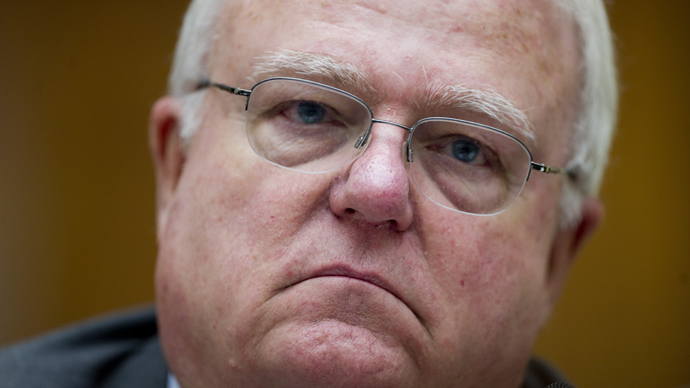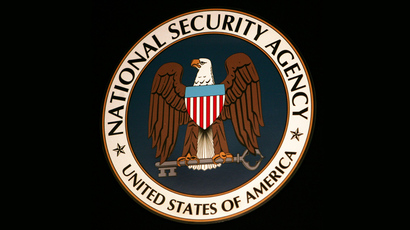Patriot Act author aims to end NSA bulk collections in new legislation

The Republican co-author of the US Patriot Act is set to reveal bipartisan legislation that would curb the domestic surveillance power of intelligence agencies.
Rep. Jim Sensenbrenner (R-OH) - who helped construct
intelligence-gathering power for government agencies via the
Patriot Act following the attacks of September 11, 2001 - said
the recent National Security Agency revelations have shown these
powers have been taken too far, for example, the broad collection
of phone records of all Americans.
It’s time “to put their metadata program out of business,”
he told the Guardian.
Sensenbrenner’s USA Freedom Act - Uniting and Strengthening
America by Fulfilling Rights and Ending Eavesdropping,
Dragnet-Collection, and Online Monitoring Act - in the House of
Representatives will be unveiled in tandem with Senate Judiciary
Committee Chairman Patrick Leahy’s similar proposal.
The bills aim to pull together various efforts to reform the
NSA’s surveillance powers following the disclosures made possible
by former intelligence contractor Edward Snowden.
The USA Freedom Act has four main planks: to require courts to
disclose surveillance policies in an effort to end “secret
laws”; to install a special court advocate focused on
protecting privacy interests; to give companies the opportunity
reveal the number of requests for customer data they have
received from the US; and to tighten loopholes in existing
overseas surveillance mandates that can be used to access
Americans’ internet and email data.
Tightening Section 215 of the Patriot Act to limit collection of
business records like telephone metadata is a major aim of the
House legislation, given broad interpretations by spying courts
in the past. The new definition of Section 215 would require the
NSA to convince the courts established by the Foreign
Intelligence Surveillance Act (FISA) a target was “an agent of
a foreign power,” was “subject of an investigation” or
was figured to be “in contact with an agent of a foreign
power.”
"Having the three qualifications would make it very clear that
they have to find out who a bad person is first, get the FISA
order, and then see who that bad person was contacting to get the
information rather than find the needle in a very large haystack,
which is what the metadata was," said Sensenbrenner, chair of
the House Judiciary Committee.
A 2006 amendment to the Patriot Act demanded only
“relevant” targets are allowable, though the NSA convinced
the FISA court the clause was more expansive
rather than constrictive, and “that's what brought about the
metadata collection, which amounts to trillions of phone
calls."
While intelligence officials say this broad definition is the
only way to gather enough data to find connections that could
ward off nefarious plots, Sensenbrenner sees the bulk collections
as more of a hindrance.
"The haystack approach missed the Boston marathon bombing, and
that was after the Russians told us the Tsarnaev brothers were
bad guys," he said.
The legislation is likely to have some support based on a House
vote in July, when a temporary measure to defund NSA bulk
collection operations was barely defeated, 217 to 205. In
addition, members of the Senate, including Ron Wyden (D-OR), Mark
Udall (D-CO), Rand Paul (R-KY) and Richard Blumenthal (D-CT),
have pushed similar reform legislation in the upper chamber.
"Opinions have hardened with the revelations over the summer,
particularly the inspector general's report that there were
thousands of violations of regulations, and the disclosure that
NSA employees were spying on their spouses or significant others,
which was very chilling," Sensenbrenner said.
He added the dual House-Senate approach is the best way to
maximize reform momentum and opposition to bulk collections by
intelligence agencies.
"I wanted to get a bill passed, and the best way to get a bill
passed is to have the chairman of the judiciary committee and the
most senior US senator [Leahy] co-sponsoring it," he said.
"We need to change the law, and we need to change the law
quickly."
Sen. Dianne Feinstein (D-CA), chair of the Senate Intelligence
Committee, is likely to be the greatest foe to any measure that
seeks a ban on large-scale collections, as she has been
supportive of the NSA through the myriad revelations over the
summer. She has proposed more oversight on current NSA capabilities
rather than addressing any abuse within the programs, to
Sensenbrenner’s chagrin.
"I do not want to see Congress pass a fig leaf because that
would allow the NSA to say 'Well, we've cleaned up our act' until
the next scandal breaks," said Sensenbrenner.
"[Party leaders] are going to have to review what kind of
people they put on the intelligence committee. Oversight is as
good as the desire of the chairman to do it."
The Ohio congressman said constraining the ability of Director of
National Intelligence James Clapper to collect vast amounts of
domestic communique will cause a stir.
"I anticipate a big fight, and Senator Feinstein has already
basically declared war," said Sensenbrenner. "If they use
a law like Senator Feinstein is proposing, it will just allow
them to do business as usual with a little bit of a change in the
optics."
He added that he believes Clapper should have been ousted for
misleading Congress about bulk phone-record
collections.
"Oversight only works when the agency that oversight is
directed at tells the truth, and having Mr. Clapper say he gave
the least untruthful answer should, in my opinion, have resulted
in a firing and a prosecution," said the congressman.
Another key aspect of Sensenbrenner’s bill is to limit other
means presidents and intelligence agencies have used to skirt
legislative boundaries.
"I have always had a lot of questions about administrative
subpoenas such as national security letters, and the bill adds a
sunset date for national security letters, which were originally
authorised in 1986,” he said.
Publication of the House’s USA Freedom Act, also sponsored by
Rep. John Conyers (D-MI), is pending based on the government
shutdown.
Sen. Leahy’s office said his version of the bill will be
introduced in the Judiciary Committee once the shutdown
concludes.














